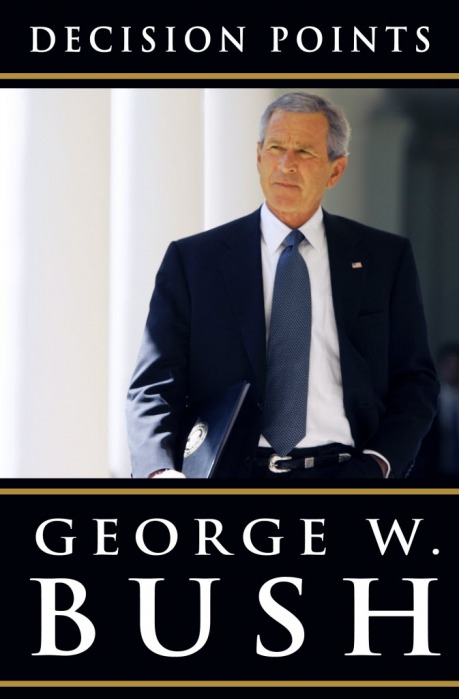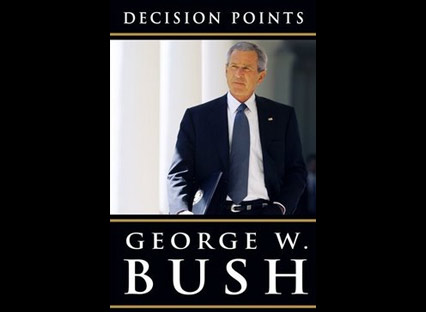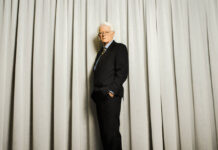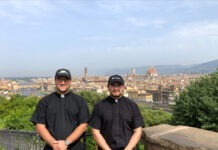On Wednesday, March 19, 2003, George W. Bush marched into the White House Situation Room, a lynchpin of governmental communication and intelligence.
As the faces of senior White House deputies and military commanders in the Middle East flashed across a video screen, the forty-third President of the United States began to ask some final questions about the proposed strategy of military action in Iraq. Without hesitation, each leader affirmed the war readiness of the entire armed forces. After much deliberation, and with a surprisingly calm and resolute demeanor, Bush asserted, first to his commanders and later to the world, “For the peace of the world and the benefit and freedom of the Iraqi people, I hereby give the order to execute Operation Iraqi Freedom. May God bless the troops.”
The decision to depose Saddam Hussein and liberate Iraq is one of the controversial and defining decisions made by President George Walker Bush during his time in office. The President’s memoir, Decision Points, gives the American people an exclusive, inside look at the complicated and significant decisions that shaped George Bush’s presidency. The former President lays out his life and time in office in terms of the major decisions that shaped his career, from his decision to quit drinking to his choice to bail out major banks during the 2008 financial crisis. Bush dedicates each chapter to a different decision that he made, offering exclusive insight into the choices that ultimately delineated his presidency. In Decision Points, President Bush leads the reader through the preceding events and rationale of his decisions, shining a new light on his time in office.
Jesuit’s own Sullivan McCormick, class of 2011, interviewed Sean Desmond, senior editor at the Crown Publishing Group, on his role as chief editor of Decision Points. Desmond is a 1991 graduate of Jesuit Dallas and the son of Jesuit staff Mrs. Anne Desmond. Mr. Desmond reflected on his role in editing the unique memoirs, essentially written as a collection of stories, and on the experience of working with President Bush to capture his time in office. “The most challenging aspect was focusing the project,” said Desmond. “Each chapter of Decision Points could be a book unto itself. . . Telling the story– the history of what happened–without making the book too lengthy was incredibly challenging.” Indeed, maintaining Bush’s anecdotal stories and personal views while expanding on the decisions that marked one of the most controversial Presidents in recent history proved “a big challenge.”
Desmond also shed light on the lengthy editing process that helped him come to know President Bush on a personal level. “We met several times in his office in Dallas to review various drafts of the manuscript, and one time at his ranch in Crawford (it was 105 degrees that day, but the President was very kind and gave me a tour of Prairie Chapel Ranch in his pickup truck).” In editing the book, Desmond came to better understand the President, gaining keen insight into his character. “My perception [of President Bush] definitely did change,” he noted. “What I think is the great thing about Decision Points is that you get a very intimate sense of how President Bush dealt with very difficult issues in real time — you get to walk a mile in his shoes.” Most of all, Desmond held, the book gives the reader an intimate look into the difficult choices that face the leader of the free world. “Being President is far from an easy job, but my respect for how hard a job it really is grew a great deal.”
Members of the Jesuit community who read the book also offered their critiques of the memoir and the motivations of President Bush’s decisions. Some, such as Information Commons Director Mark Wester, appreciated the plain, down-to-earth way President Bush depicted his time in office. “I read this book and was surprised at the thought and clarity of message that it delivered,” said Mr. Wester. “I have grown to expect a particular quality of narrative from both political memoirs and President Bush. I found this to be a much less cluttered and stuffy account of the decisions he made and some of the presumptions that he makes about those decisions.”
Jesuit readers, though, had mixed reactions to President Bush’s decision making and decisively conversational style of writing. “What strongly came through to me from reading Bush’s book,” noted Assistant Principal Fred Donahue, “is that he is not a thoughtful or reflective man. For a memoir of one who led the nation, some would say disastrously, for eight years, the book comes across as ‘chatty’ rather than seriously reflective. He comes across to me as simple, unsophisticated and insecure in his position, and unable or unwilling to think deeply about issues. . .All in all, I found the book, like the man and his presidency, disappointing.”
But some, like theology teacher Jude Harrington, found President Bush’s personal and intimate recounting of his life refreshing. “As a young father, the moments in the book between President Bush and his children or his father truly stuck out to me,” said Mr. Harrington. “These moments personalized him for me. My favorite moment was President Bush’s first time in the Oval Office and his dad walks in and says, ‘Mr. President,’ with [George W. Bush responding] ‘Mr. President.’ I loved the moment between a father and son that was unique to them but happens to everyone with their parents or parental figure in some way. . .It was good to see that despite where you are in life parents are always parents in some way.”
All in all, the Jesuit community, like the general public, found the book to be engaging and personal. Readers across the country, echoing Mr. Wester’s praises, appreciated President Bush’s down-to-earth, relatable recount of his time in office and have kept Decision Points on the New York Times Bestseller List for over three months.






